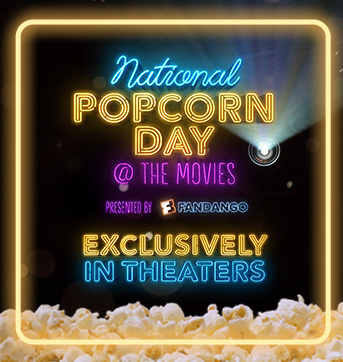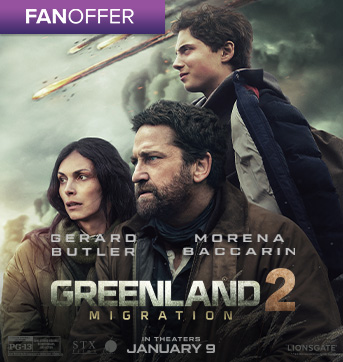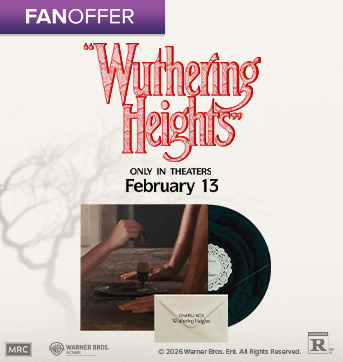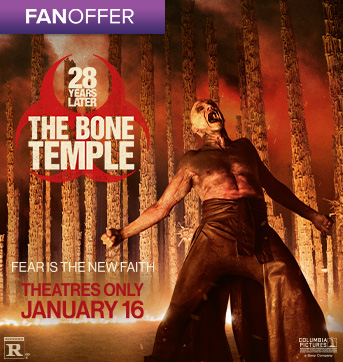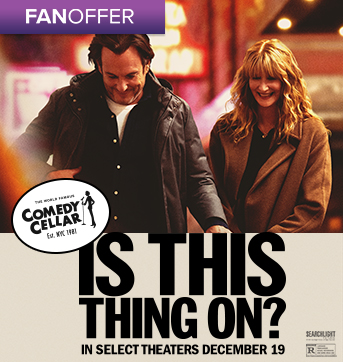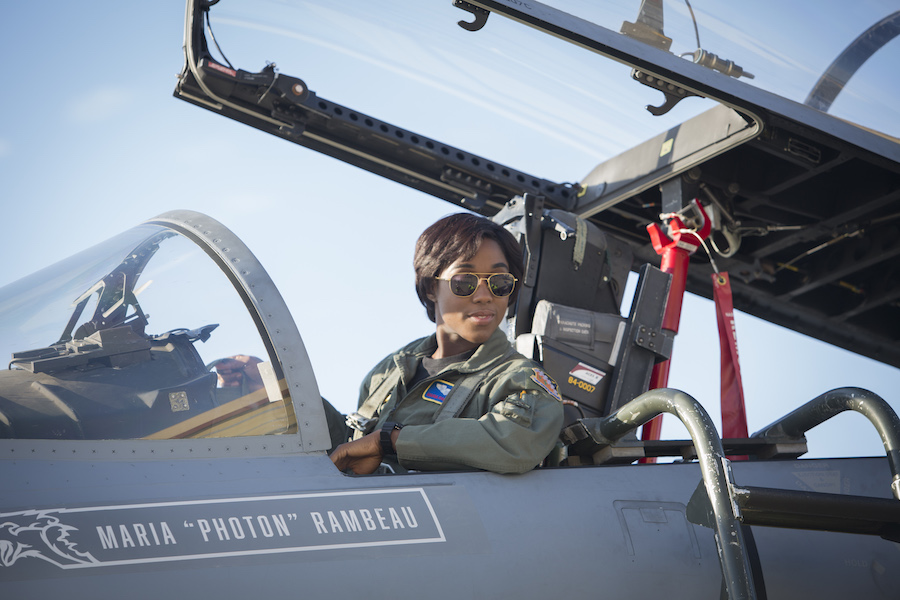
When Captain Marvel hits theaters in March, no one will be surprised if it upends everything audiences have previously seen in movies featuring women as superheroes. In fact, we are counting on it. The last few years have witnessed a paradigm shift in the industry’s willingness to back films which feature women and minorities in leading roles, and which tell stories utilizing those talented individuals in roles that might not normally go to them. Marvel has particularly focused on making sure the momentum continues.
A lot has been written about Carol Danvers/Captain Marvel, who will be played by Brie Larson in the upcoming film. Larson has spoken at length about portraying the iconic superhero, and, as much as she is allowed to say sans spoilers, on the character of Carol Danvers herself. But what about the other women in Captain Marvel? In particular, what about the character, Maria Rambeau, played by British actress Lashana Lynch? Everyone is buzzing about Rambeau, the role she plays in Avenger’s history, and her makeover in this next MCU offering.
So who is she?
Lashana Lynch was a regular on UK screens after her 2011 debut in the film Fast Girls, earning her subsequent appearances on BBC shows such as Silent Witness and Crims. But it was her portrayal of Rosaline in the ABC drama Still Star-Crossed where she caught the attention of American audiences and Marvel, and she was cast as Maria Rambeau. A civilian and relatively minor character in the comics, she does have one significant relationship to a major character: she is the mother of Monica Rambeau, a superhero who was also known as Captain Marvel. Apparently, a young Monica appears in the new film, played by Akira Akbar. How and when Monica will take up the mantle is probably the singular most closely held secret in the MCU.
The MCU has reimagined Rambeau’s character, who was a seamstress in the comics, as a fighter pilot. This welcome update and departure from the usual portrayal of African-American women in film allowed Lynch the mind-blowing chance to play a part in practically creating a new Marvel character. Asked about how being in that position felt, Lynch replied that it is “a real treat.” She credited Marvel and the movie Black Panther for raising everyone's awareness to the fact that, “we just don't have many Black superheroes and our younger generations aren't seeing enough of themselves.”
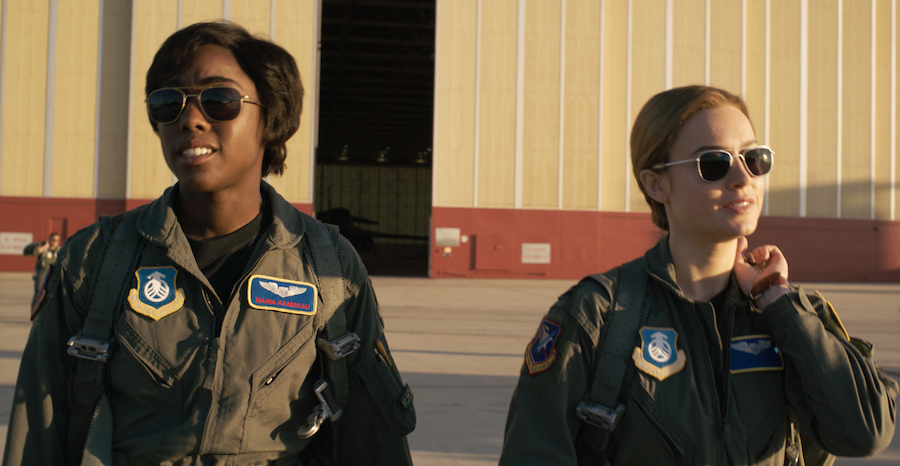
She continued, “So, in creating Maria, it made me realize that the younger generation is going to have what I didn't have as a kid, which is seeing themselves on screen. So, this will be a classic film for the new generations to come, which is crazy, and also the new normal, which I can't wait to be.”
The process for her, though, is not an entirely new one. “I did an ABC and Shonda Rhimes series a few years ago called Still Star-Crossed, and I played Rosaline, who is mentioned in like a sliver of a verse in Romeo and Juliet, and I got to characterize her from scratch. So, I feel like I'm repeating the same kind of process. I can just bring whatever I want and the directors Anna Boden and Ryan Fleck are so cool. I was like, ‘Actually, I feel like she can be like this,’ and they're like, ‘Yeah.” So, I've had free rein, within reason, and it's been a very free and an exciting experience.”
The other intriguing thing about Lynch’s character is her relationship to Carol Danvers, which is described by both actresses as incredibly close. Larson calls the relationship “more complex, and more meaningful than most love relationships that I see in films like this,’ and said that the character Rambeau “is the representation of love in this film."
In answer to the question, “Are Danvers and Rambeau yin and yang,” Lynch agreed enthusiastically. “Absolutely! Absolutely, absolutely.” As to how the characters are with each other, she laughed. “You know when you love someone and you pretend like you hate them? They have that little bit of a slightly unlikely boisterous, yet very loving, deeply loving, caring sister love. Carol Danvers is someone who is an aunt to my child, like she is family and that's why her death take such a big effect on her life because she actually is her life. They're in a male-orientated environment and industry, and all they have is each other, those female fighter pilots. So yeah, they're extremely close, extremely.”
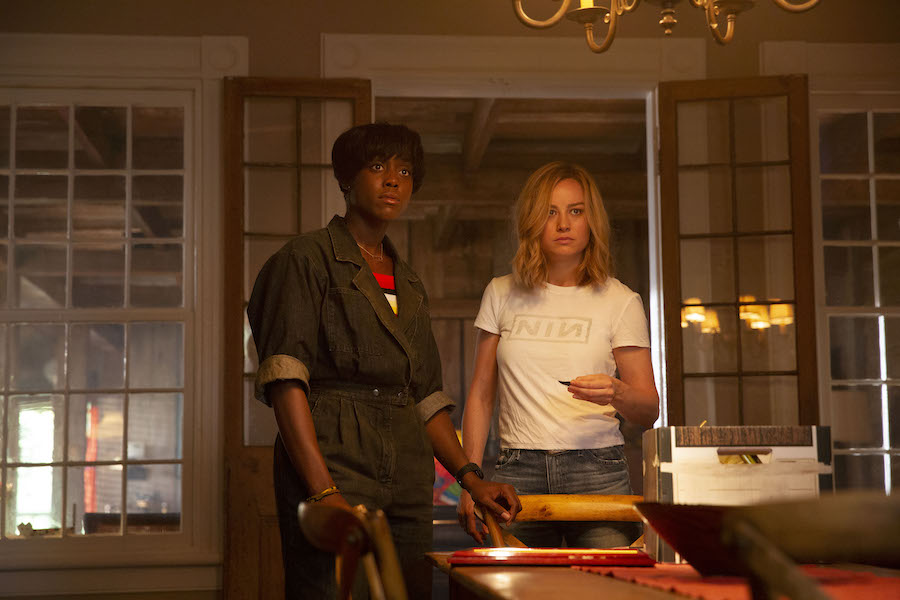
Through flashbacks, we get to see a lot of Carol and Maria’s friendship when they were pilots together.
“You do get touches of moments to see how happy they were before and how happy they made each other. Because of that, when she comes back, you see why it affected her so much, why her death was such a big deal. And imagining my character now being the only female fighter pilot, African-American as well, in the Air Force base would have been hell. So, from her going from working with someone and actually being complete bum chums to being alone, and raising a child single handedly with the help of their parents is a hellish experience and I could relate to that, as well as having lost someone myself. It's hard.”
How does the unflappable Rambeau react when her friend returns from the dead, so to speak, and is changed in ways she may not understand? “Sarcastically. ’Sure. Okay. So it's just meant to be okay and just normal to me? Okay, sure.’ That is how she reacts. Like, ‘I'm just frozen in time because the last memory I have of you is so fond and so normal and so graceful, that now you have a different shell of strength that is great, but you need to also remember that you're a human being, but I don't quite know how to do that for you yet.’ So yeah, very sarcastically, mostly, but also takes to it very quickly. And one thing that Carol needs that Maria gives her is understanding.
"I can't empathize with the fact that you have power, because I can't. That was definitely Spider-Man. I can't just do whatever she does, but I know what it feels like to feel lost, and trying to regain yourself after having a child, and feeling like I've lost a part of myself but gained another part of myself. I'm trying to find that balance in my mind.’ So, she just uses the different parts of her life to understand where she's coming from.”
Lynch says that despite the circumstances of Carol’s return, the friendship holds. “I think that, the way this story is being told, in the time that it is being told, because we're starting with Carol's entrance into the world, or this new person, I wouldn't say that we necessarily see vulnerability, but we see tenderness, and I think that's warranted and it's enough for the relationship that she has with Carol. She almost has to remind Carol who she is, where she came from, and what she represents, who's she's about, and the mark that she can now place on the world through this power that she's gained. So, for me at this moment in time, I think it's nice to see tenderness, love, care, and handling grief in a very complicated way.”
Although the timelines aren’t particularly clear at the moment, apparently Rambeau does encounter Nick Fury at some point.
Asked about how she reacts to him, Lynch answered, “Coolly. Literally. One thing I noticed when I read the script is that she doesn't flinch. She has stillness about her, which is so attractive in a woman and in a human being, I feel that, because of her work, she just doesn't flinch. She really takes new experiences and just makes it work for her. There's some situations that she encounters on the way, throughout the film and she never argues, she never asks questions. She's a bit like me when there's something new. I’ll make it work. Don't need to ask questions. She just handles herself in a very professional and collected fashion that no one else there has to question her ability. And again, I think that comes from being an African-American female fighter pilot, in a white-male orientated environment. So, she had no choice but to be strong.”
Outside of her relationship with Carol, Rambeau is just living her life. Refreshingly, there looks to be a complete absence of a man’s affections as a primary motivating factor for Rambeau. “We're flipping the black single mother idea on its head and being like, ‘She's a fighter pilot, she’s black, and she's a single mother. She doesn’t need a husband. She doesn't need a boyfriend. She doesn't need any males in their life because you've only got one male that's probably the best one, that's her father. Everyone else has been the males at work who have given her a freaking hard time for just existing. So, she's all right.”
But the fact that the character is a black single mother isn’t something that Lynch feels needs to be driven home in the story. “We have representation now to hopefully not have to talk about representation in the future, so why do we then have to have a conversation in a film? We're already having it in the industry. We don't need to apologize or explain ourselves with the film.”
Sounds like Lashana Lynch has a solid handle on what it would take to be Captain Marvel’s best friend. Or Captain Marvel’s mom, for that matter, because, as Lynch said during this interview, “Maria has raised an amazing child and now this child is probably going to turn out to be a superhero because she's been raised by one.”
We can’t wait to watch not only how this reimagined relationship unfolds, but how it influences Monica Rambeau’s future in the MCU.
Captain Marvel is in theaters March 8 and tickets are on sale now on Fandango. Check out more from our Captain Marvel set visit here.
DaVette See is a freelance writer and filmmaker living in Inglewood, CA. She loves movies, old TV shows, books, and music. She is also a wife, daughter, and mom to eight (yes, eight) cats. When not writing while covered in fur, she is working on her upcoming web-based talk show, Afro Bites! Follow her on Twitter and IG @mariavah.

